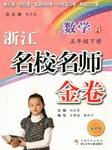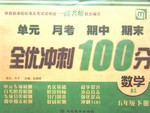题目内容
"Where's your brother, Jane?" "He's not in Guiyang these days. He________ Beijing.'
A. has gone to B. has been to C. had been to
答案:A
解析: 根据句意:你哥哥Jane在哪里?这些天他不在贵阳,他去了北京。Has gone to去了;has been to去过。故选A。

练习册系列答案
 浙江名校名师金卷系列答案
浙江名校名师金卷系列答案 全优冲刺100分系列答案
全优冲刺100分系列答案
相关题目